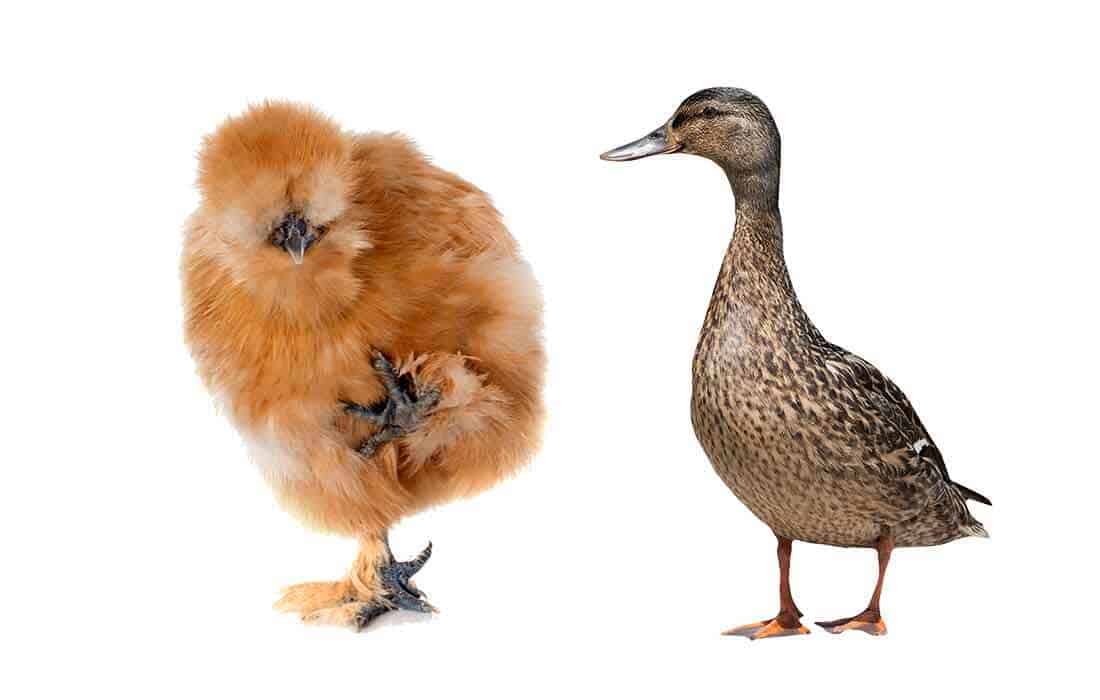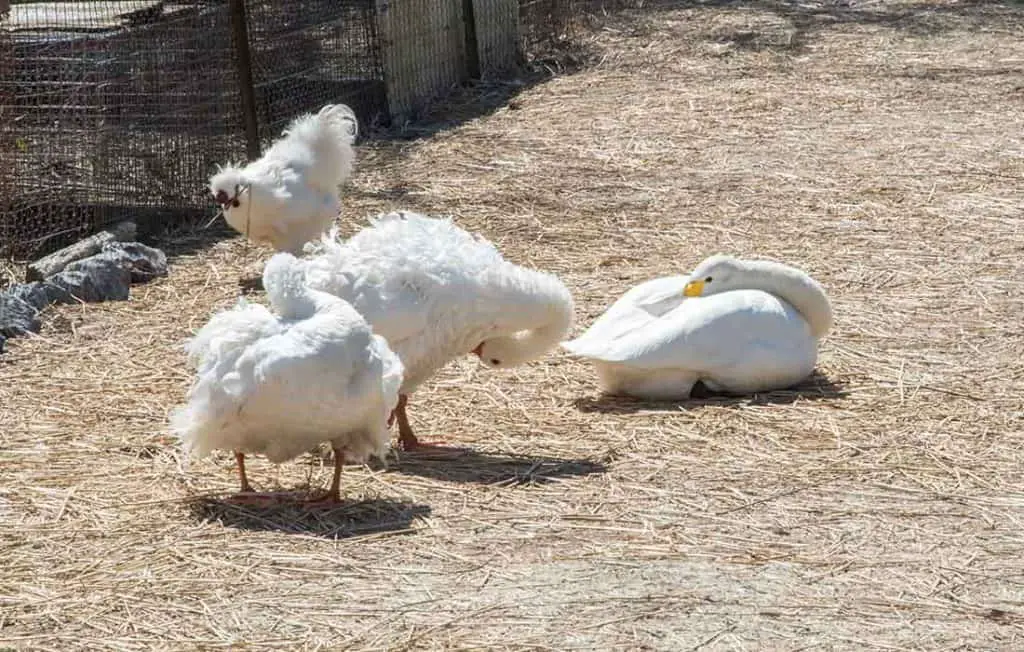It isn’t unheard of for chickens and ducks to live together. My neighbor owned both, and aside from the occasional territorial squabble and wet beddings, they got along reasonably well. At the time, I exclusively raised silkies, so this made me wonder: can ducks and silkies live together?
Can Silkies and Ducks Live Together?
Silkies are an exceptionally docile and friendly breed, so it might not come as a surprise that they get along relatively well with other animals. Yes, this includes ducks!
This article will show you how to raise these two breeds together. I’ve also included a small list of potential problems that may occur during the process. Stick around to find out more!

*This page contains affiliate links to products I recommend. If you purchase something from this page, I may receive a small percentage of the sale at no extra cost to you.
How to Raise Silkies and Ducks Together
Whether you’re adding ducks to your existing Silkie flock or the other way around, here are some tips to effectively achieve a mixed-breed harmony between the two.
Most chickens can live with ducks, but in some instances chickens will kill ducklings.
Prepare a Water System
If you’re raising silkies and ducks separately, you wouldn’t have to worry about the water systems. However, if you decide to raise them together, you’ll be faced with a bit of a predicament.
Chickens, no matter the breed, generally drink water from water fonts or through nipple waterers. Ducks, on the other hand, need to have access to water that’s deep enough to dip their little heads in. They use this to clean themselves, keep their nostrils moist, and to mix their food in the water to aid digestion.
You can get a large water bowl for your silkies and ducks to share, but you’ll have to keep refilling and cleaning it. You certainly have better things to do than watching over their water bowl!
There are two solutions to this problem. One, get your ducks their own kiddie pools. Two, get a fully automated chicken waterer.
If you don’t have much space in your backyard, opting for the latter is the best option. These automated systems automatically fill up when the water level gets low. Plus, they’re small enough to prevent ducks from jumping in but big enough for them to drink from.
Set Up Two Separate Coops
Silkies and ducks living inside one coop isn’t as unusual as you might think. But here’s the thing: silkies love to sleep higher off the ground as it makes them feel safe. Ducks, however, love nesting on the floor.
Ducks also don’t sleep through the night as silkies do; they’d randomly wake up to talk to their duck buddies and move around the coop to subdue their boredom.
To top it off, ducks frequently get nests wet!
If you’ve ever closely observed them, you’ll notice that they don’t just gently dip their bills in the water like chickens do when drinking. Instead, they’d try to get in the bowl and splash water everywhere.
Wet feathers don’t bother them, so they’d get into bed drenched without a care in the world.
Now, imagine silkies and ducks sharing the same bedding space. Silkies would probably stay up all night, unable to sleep, waiting for their beds to dry! Silkies don’t like to be wet and can become sick, especially if it’s cold outside. Here’s how to care for your Silkies.
The best option is to get two separate coops to help protect your chickens.
Food Exceptions
Silkies and ducks eat the same things, so you don’t need to get either one anything overly special. Regular chicken feed works well because it’s inexpensive and can be purchased just about anywhere.
However, if you’re feeding your silkies medicated feed, you’ll have to purchase two separate feeds. Medicated feed is extremely toxic to ducks, so avoid feeding it to them as much as possible.
If you’re raising ducklings, they’ll need a vitamin called niacin to prevent the development of neurological problems as they grow older. Add it to a separate trough feeder at a ratio of 5%—away from your silkie chickens’ feeder.
5 Potential Problems of Keeping Ducks and Silkies Together

Generally, as long as you have two separate living quarters beforehand, these two breeds will get along quite nicely. However, you still might encounter several problems that might make you want to keep them separated.
Territorial Issues Between Roosters and Drakes
Silkies and ducks generally keep to themselves. As long as one breed doesn’t bother the other, you wouldn’t find any issues. This is the same when trying to get Silkies to live with other chickens.
However, roosters and drakes are quite oversexed and territorial, especially during the mating season. For this reason, it’s best to keep silkie roosters and drakes separated.
Also, for every drake you own, make sure he has at least three or four female ducks to call his own. Otherwise, he might target silkie hens and even mate with them.
Mating Season
One of the biggest problems you may face when raising silkies and ducks occurs during their mating season.
If you already own roosters, you might know that penetration doesn’t happen during intercourse. Instead, a sort of “sperm packet” is released by roosters and is taken into the hen’s cloaca.
It’s an entirely different story with male ducks. Drakes have long and pointy penises, so if the mood strikes them, they might forcefully restrain a hen and mate with her like they do with female ducks. This can cause severe internal injuries and seriously injure the hen.
It also isn’t unheard of for a rooster to try to mate with a duck, but it’s not nearly as dangerous and life-threatening as when drakes do it with hens.
If you don’t own any drakes, this won’t be a problem. If you do, it’s best to keep the two breeds away from each other during mating season.
Behavioral Concerns Due to Pecking Orders
Unlike chickens, ducks don’t care about the politics of pecking orders. Drakes and ducks may squabble a bit, but they don’t feel the need to enforce a definite order in their flock.
Chickens, however, always fight over who’s on top. This might be dangerous for a duck who’s minding her own business and uninterested in establishing a pecking order with her neighbors.
If a battle ever occurs, ducks might come out losers. After all, chickens have beaks and talons that can damage ducks who are less equipped to fight such strong opponents.
Health Issues
Both ducks and silkies have their fair share of health concerns that owners should be aware of.
Ducks are generally hardier than chickens because their higher body temperatures prevent external parasites from surviving and infesting them.
Chickens, however, are quite susceptible to mites and lice. Ducks are super messy when it comes to their living quarters, so if silkies and ducks live together, there’s a higher chance that your silkie will be infected with parasites because of the dirt ducks might bring in.
If you choose to house both breeds together, you’ll need to make sure that their living quarters are always clean. Even if they live separately, it’s still a good idea to perform regular maintenance in their coops.
Water Safety
Ducks are built for swimming. They have powerful webbed feet to propel them, waterproof feathers, and they can easily ‘right’ themselves in water. Silkies, on the other hand, aren’t. This isn’t to say that they’re entirely inept swimmers, but they definitely won’t win any medals in a swimming competition.
Therefore, if you own a pond, it’s imperative to keep it securely fenced so your chickens and chicks won’t accidentally fall in. Kiddie pools shouldn’t be a huge issue for adult silkies if they’re only a few inches deep, but they can be fatal for chicks.
Extra care is needed to keep chicks away from ponds, pools, or even deep water bowls. For safety reasons, I think it’s a good idea to keep the chicks away from ducks when they’re young.
Bottom Line
Ducks and silkies can live together, but it isn’t always without several drawbacks. If you have enough space to house the two breeds away from each other, then it should be fine. If not, you may want to reconsider mixing ducks to your existing silkie flock and vice versa.
Related Articles